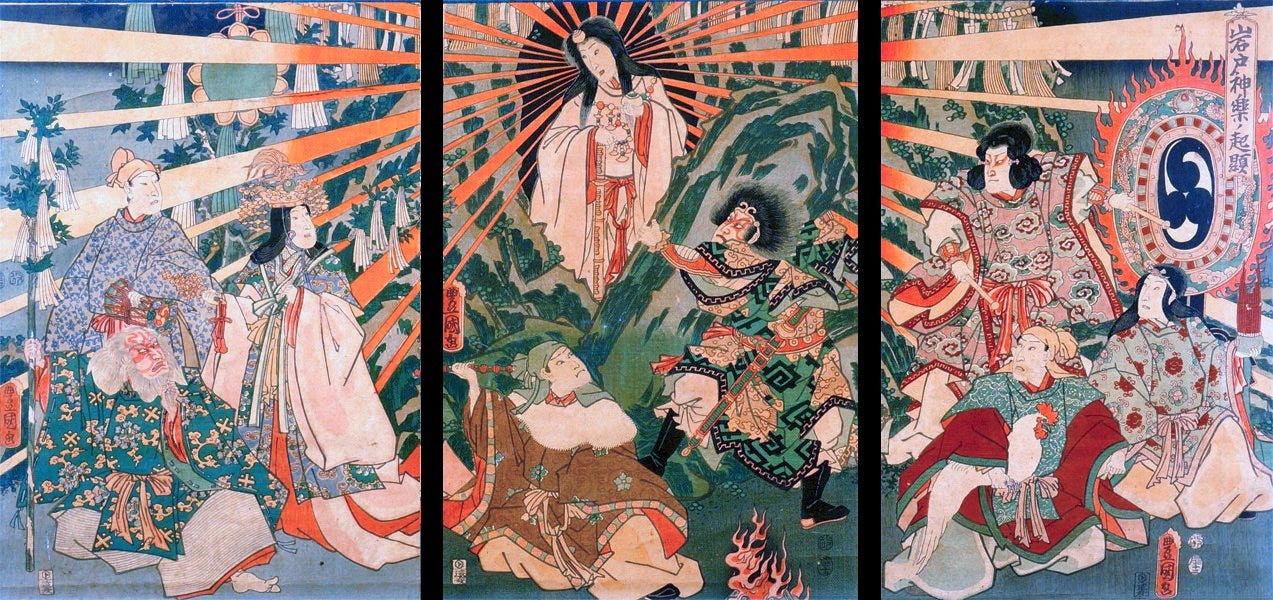Why are you so afraid to create?
On dancing with our inner critics and being more cringe
 “Amaterasu Emerging From a Cave” by Utagawa Kunisada
“Amaterasu Emerging From a Cave” by Utagawa Kunisada
Alex Tizon believed that every person has an epic story that resides “ somewhere in the tangle of the subject’s burden and the subject’s desire ” - my inner critic forms a big part of my burden, and every door it quietly shuts holds me back from a life that inspires me.
Sharing this writing feels like one of the most exposing things I’ve done in a long while, it shows my inner workings to strangers and gives them the power to validate the voice of my critic (“ your writing is cringe, why would anyone care?”) - it summons feelings of fear, humiliation, overexposure.
There are all sorts of assertions I’ve heard from my critic:
- “You’re not capable enough for that job”
- “You’re not attractive, intelligent, or funny enough to be with this person”
- “You’re not disciplined or motivated enough to make those lifestyle changes. You’ll always be like this”
- “You aren’t creative enough to do x, you’re a fraud”
They’re one of the many voices that sit at the round table in my mind and create the tapestry of me. Their arguments can be cruel, but understanding my critic’s motives has helped me to find meaning in the signals. I’ve found delicate experiences sitting behind these messages - times I was made to feel powerless or insufficient. The critic protected me from racism as a child, it wrote you are loathsome in permanent ink so I’d never allow myself to feel accepted or safe. If I did, there was a risk I could be rejected again - the critic stopped me from being lulled into a “false” sense of safety, and successfully removed the power of others to hurt me. This armour was valuable in school, but as an adult it’s a straitjacket - the threats have disappeared but I’m still timid with my actions.
My critic is helping me see clearly the expectations that I’m subconsciously trying to live up to, and helping me to make decisions that are true to myself. I know now that being valued for my ideas matters to me deeply, otherwise the stakes wouldn’t feel so enormous for my critic. A new voice is slowly developing, a critic-wrangler, they’re quietly enjoying translating Critic’s diatribes and finding magic under the cynicism.
If I’m regularly brushing up against a decision that my critic holds me back from, I like thinking about the worst case scenario, where it all goes as horribly wrong as they could possible conceive. When I weigh up that scenario against the portrait of a life that is breathtaking to me, how obvious is it that I need to take the risk?
“I realize that if I wait until I am no longer afraid to act, write, speak, be, I’ll be sending messages on a ouija board, cryptic complaints from the other side.” - Audre Lorde
Fall flat on your face, baby steps or huge leaps - the work is always honest and valuable where fear is your compass for truth. These acts slowly show us that different versions of ourselves are possible, and the courage it takes to do so is reward enough, regardless of outcome.
Writing this felt like going to war with myself: I belittled my own truths, convinced myself to spend time elsewhere and suffocated my own progress by obsessing over tiny details. I felt physically sick at the thought of sharing this writing. I’m sure my critic will conjure more creative strategies to slow me down in future.
It’s thankless, uncomfortable work, and progress can feel invisible, but exposing ourselves to the spaces that our inner critics tell us to stay away from can feel deeply rewarding in practice. Here’s to more cringing in 2023.